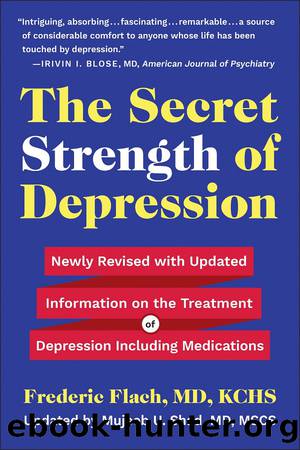The Secret Strength of Depression, Fifth Edition by Frederic Flach

Author:Frederic Flach
Language: eng
Format: epub
Publisher: Hatherleigh Press
Published: 2023-08-15T00:00:00+00:00
Guilt-makers
Unlike the Spartan away from home, depressed people have a tendency to feel guilty, which makes them particularly vulnerable to those who know how to control them by activating their guilt. Because they often suffer from the assumption that they are somehow in the wrong, they are easily convinced that they are at fault in any situation, regardless of the facts.
A 39-year-old woman consulted a psychiatrist because she felt hopeless and suicidal off and on for several months. âMy husband said there was something wrong with me. We have terrible fights. He told me I was wrecking our marriage, and if I didnât straighten out, heâd have to leave me.â
Over the next few sessions, the following impression of her husband emerged: rigid, opinionated, a man who demanded a high level of performance from himself and who was unceasingly critical of his wife. At one time or another, he accused her of not being a competent housekeeper, failing to discipline the children adequately, not entertaining enough, and being uninterested in him sexually. When she would become upset and cry, he would accuse her of being emotionally unstable. âIs he right? Am I a complete failure? Am I all these awful things he says I am?â
The psychiatrist insisted on meeting her husband to get a clearer picture of the interaction. During the entire visit, her husband acted as though he were a colleague of the doctorâs rather than the patientâs husband. âWhat can we do for her, doctor? Sheâs too sensitive. Of course, I think highly of her-I love her. She really seems very depressed. Do you think sheâs seriously ill? Thereâs a history of mental illness in her family, you know. Or perhaps she didnât tell you.â He denied that he had done or said anything that could have upset her. âThereâs nothing wrong with me. I donât have to come to see you or anyone else.â And he declined to make another appointment.
Within two months, the patient reported that her husband was now angrily complaining about the length and cost of her therapy. He had also claimed that he was in regular contact with her therapist for âprogress reports,â which he was not. Instead, he dropped remarks like, âYour doctor told me youâre not doing enough to help yourself.â His antagonism to her treatment appeared just as the patient herself was recovering some of her self-esteem and becoming better able to fend off his criticism of her.
Guilt-makers are not always so blatant in such efforts to make a husband, a wife, parent, child, or co-worker feel dreadful about himself or herself. Frequently the interaction occurs in a much subtler fashion. âLook how unhappy you are making your mother feel,â âWhy canât you be more grateful for all weâve done for you?â and similar remarks made at the right moment, in the right tone of voice and with the right nonverbal backup, are often enough keep slightly depressed people subject to the will and control of guilt-makers. Such maneuvering can sometimes
Download
This site does not store any files on its server. We only index and link to content provided by other sites. Please contact the content providers to delete copyright contents if any and email us, we'll remove relevant links or contents immediately.
Should I Stay or Should I Go? by Ramani Durvasula(6800)
Why We Sleep: Unlocking the Power of Sleep and Dreams by Matthew Walker(5659)
Fear by Osho(4097)
Flow by Mihaly Csikszentmihalyi(4062)
Rising Strong by Brene Brown(3788)
Why We Sleep by Matthew Walker(3782)
Too Much and Not the Mood by Durga Chew-Bose(3701)
How to Change Your Mind by Michael Pollan(3689)
The Hacking of the American Mind by Robert H. Lustig(3588)
Lost Connections by Johann Hari(3462)
He's Just Not That Into You by Greg Behrendt & Liz Tuccillo(3311)
Evolve Your Brain by Joe Dispenza(3060)
What If This Were Enough? by Heather Havrilesky(2948)
Resisting Happiness by Matthew Kelly(2895)
Crazy Is My Superpower by A.J. Mendez Brooks(2867)
The Courage to Be Disliked by Ichiro Kishimi & Fumitake Koga(2810)
The Book of Human Emotions by Tiffany Watt Smith(2780)
Descartes' Error by Antonio Damasio(2745)
In Cold Blood by Truman Capote(2693)
